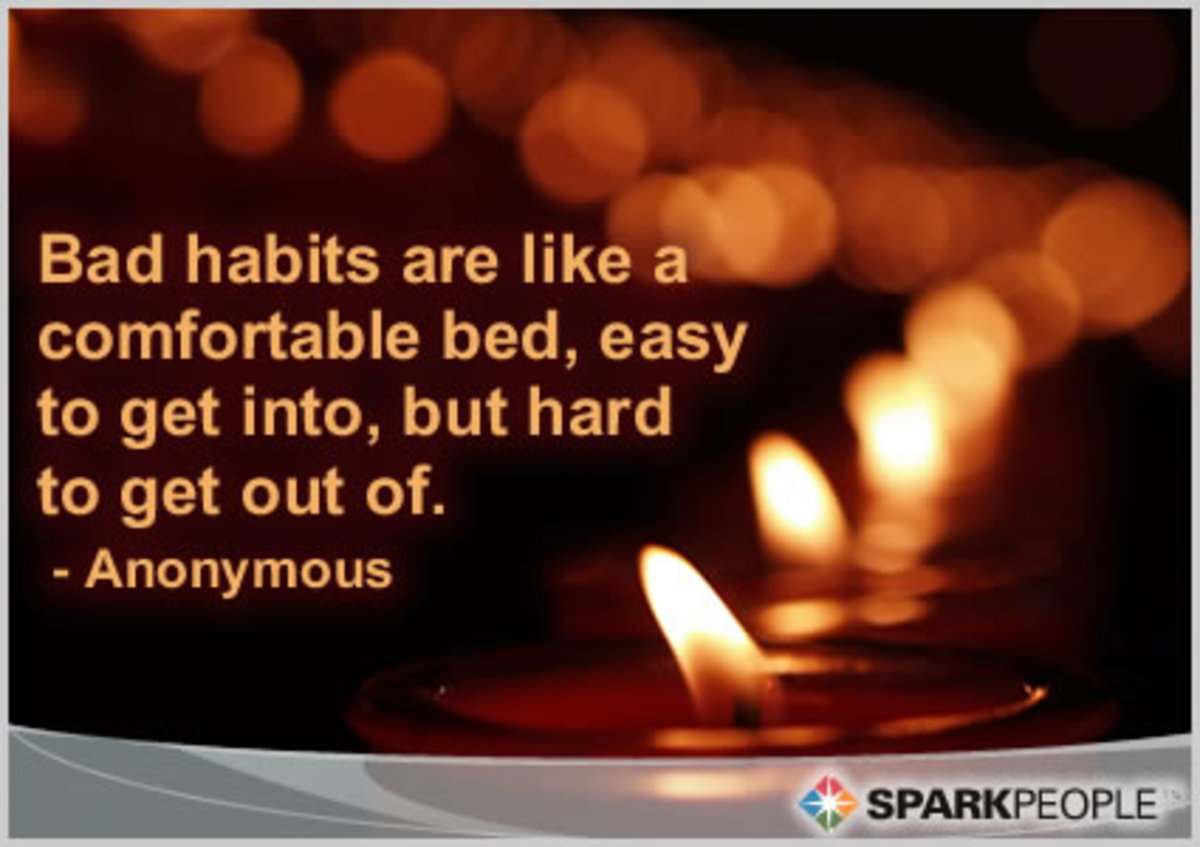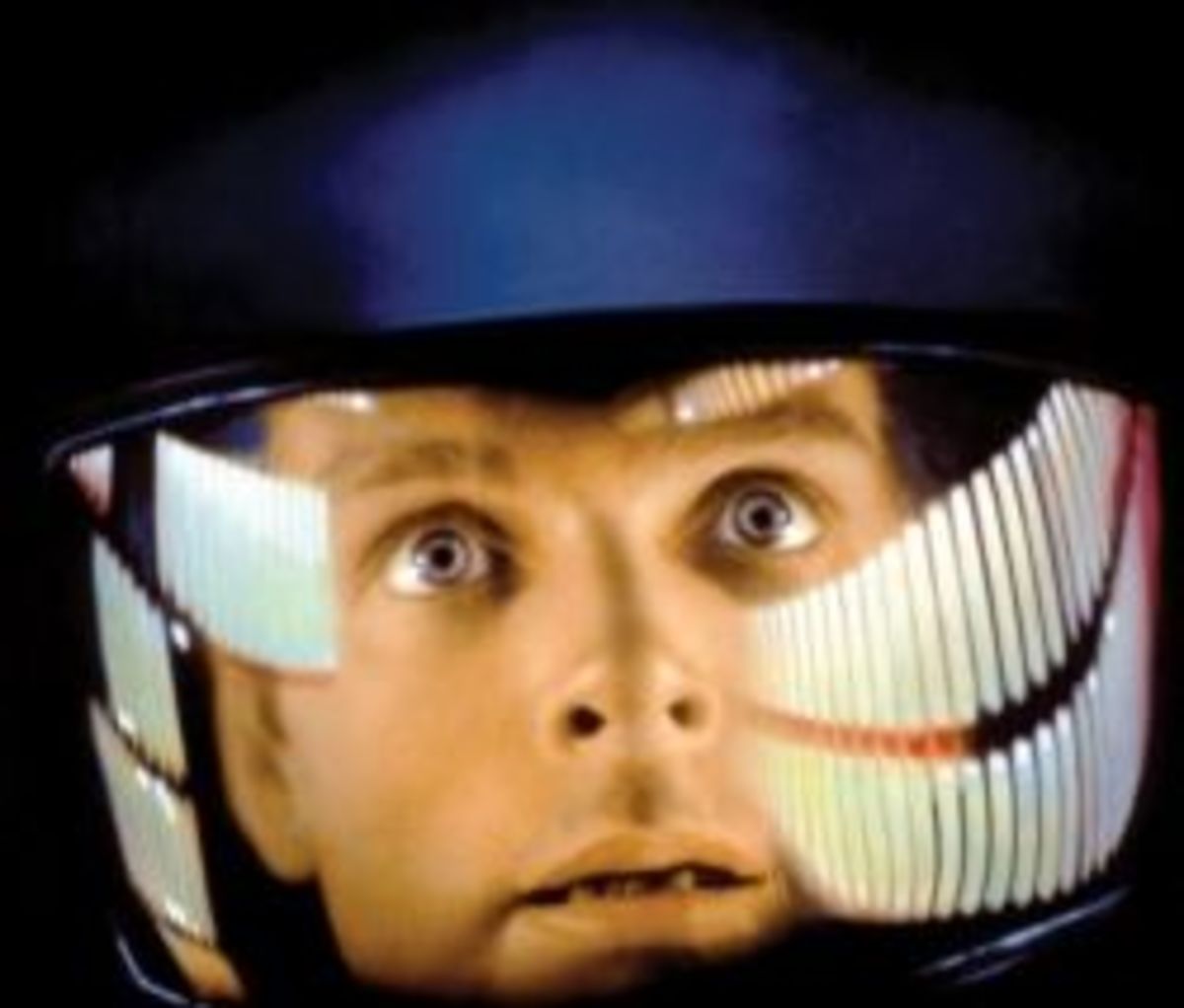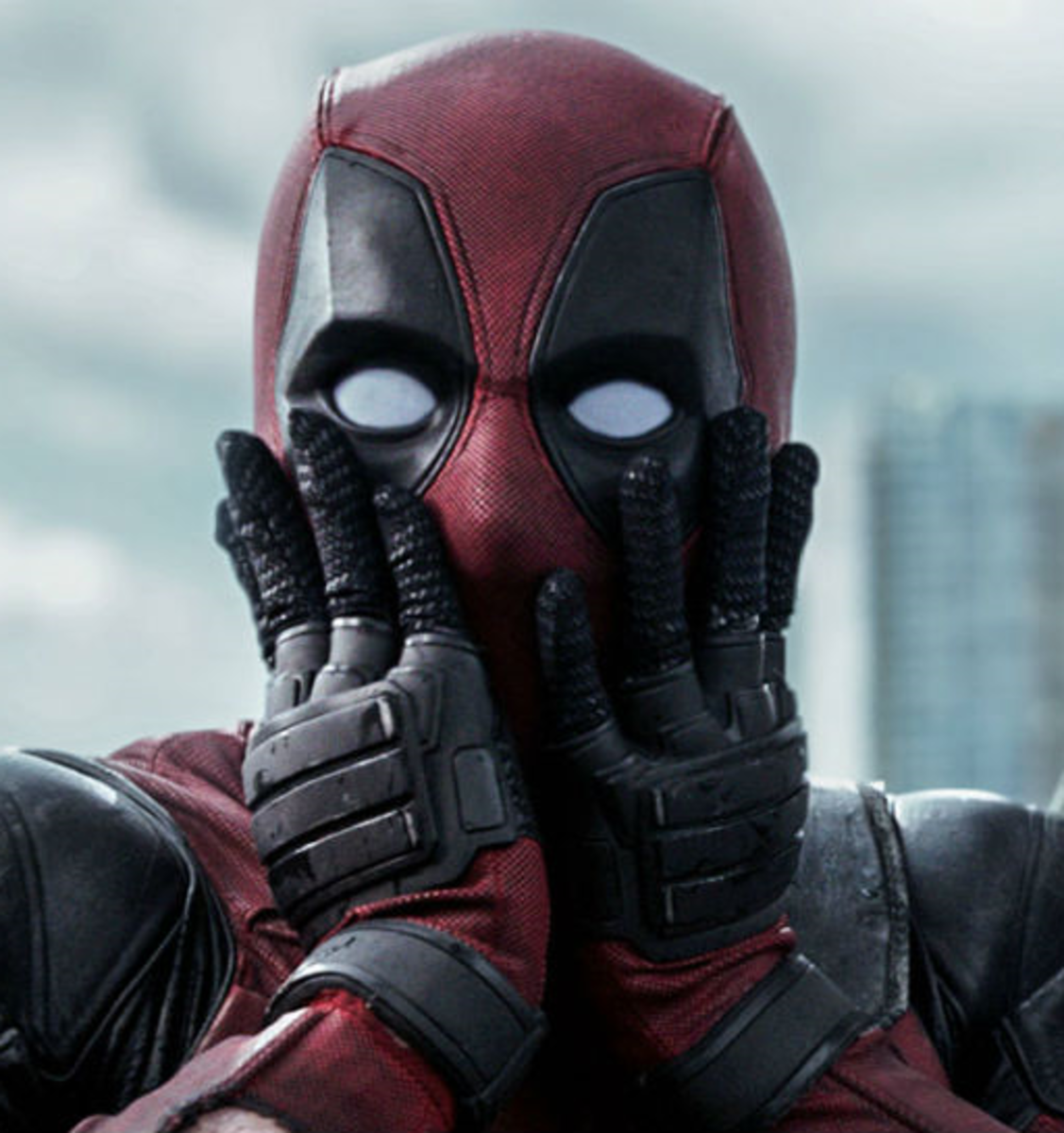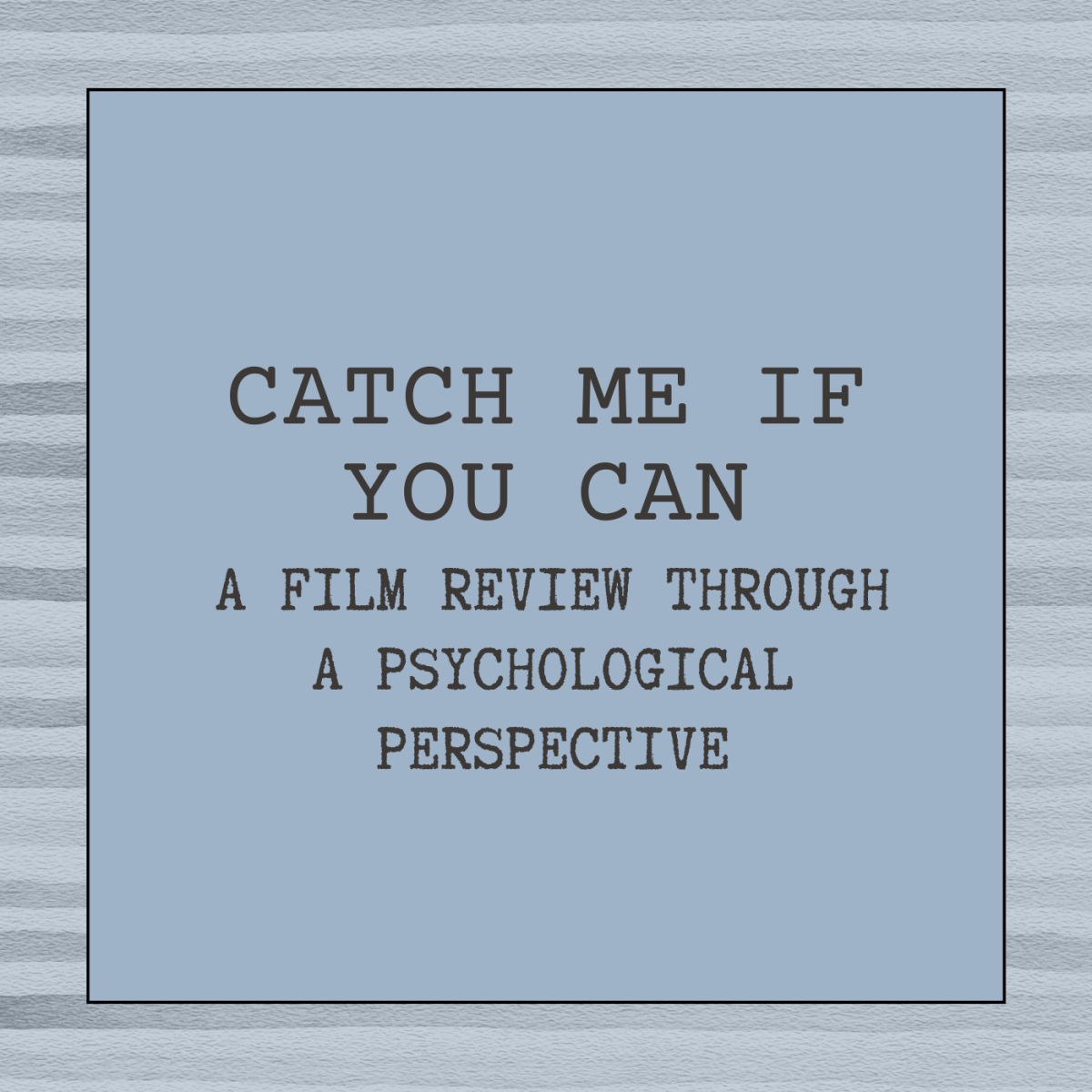Breaking Bad Movies | The Top 20 Movies Where Good Guys Break Bad
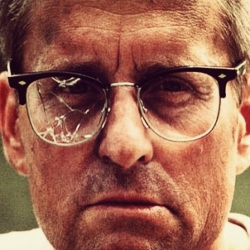
That's it! No more Mr. Nice Guy
Now that AMC's beloved TV series, Breaking Bad, has reached its inevitable conclusion (cue violins), it felt like the perfect time to celebrate some of films most memorable moments where good, mild-mannered characters rolled up their sleeves, loosened up their ties, and raised pure hell in this list of The Top 20 Movies Where Good Guys Break Bad.
Whether it's due to marital problems, madness, acts of vengeance, moments of desperation, being fed up with society, being tired of their jobs, or just having nothing left to lose, each movie on this list has, in one way or another, shined a light on the breaking points we're all capable of reaching. And perhaps, in the end, it's that empathy we have for these nice guys gone bad which makes witnessing them lose all self-control feel so gosh darn cathartic to watch go down.
These are the films about the underdogs who've cut loose and come out on top, the geeks who've fought back, and the quiet who've to finally stood up and yelled: "I'm mad as hell, and I'm not going to take it anymore!" And while some may be crazy and others may have crossed the line too far, they're all one hella fun to watch. Just try to remember: don't try this at home.
20. A History of Violence (2005)
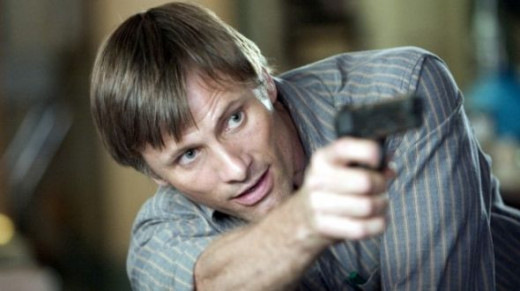
Click Here for a preview
Tom Stall (Viggo Mortensen) is a nice, polite, small town family man living a small town family life. Everyone likes him, he has good ties with the community, and with two loving children, a beautiful wife, and a friendly little restaurant which he owns and runs, things were pretty much perfect (all-American enough to be a Norman Rockwell painting, in fact). But after a couple of ruthless thugs pay an unwelcome visit to his restaurant and Tom is forced to single-handedly take them down, things all of a sudden get a lot less quiet as Tom finds himself thrust in the limelight, being held as a hero by the town and news media.
All of this doesn't sound too shabby, granted, but after Toms story begins to get national attention and his face starts being plastered all over TV sets everywhere, the next thing you know some new goons start showing up to town to pester our apple pie hero. Only they're not calling him Tom, for some reason. They're accusing him of being some tough and savage criminal from Philadelphia they used to know named Joey. Hmm...
Alright, I'll stop with the plot description right here. Because whether or not Tom really is "Tom" and not this Joey character, you'll have to watch the movie to find out. The point is, when the goons start becoming relentless in their pursuits, endangering Toms family in the process, we soon find that, regardless of who he is, breaking bad is what he does.
Buy at...
19. Risky Business (1983)
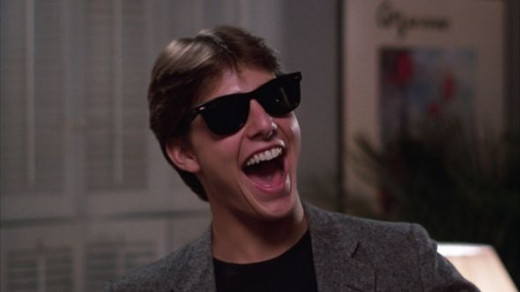
Click Here for a preview
In Tom Cruise's star-making role of Joel Goodson, the teenage son of a wealthy suburban family, we get a glimpse of a few days in the life of a normal, upper-class kid whose life gets flipped all topsy-turvy after his parents go away for vacation, leaving him alone with the family house, his fathers Porsche, and one heaping pile of hormones at his disposal.
Out of fear of destroying his future, Joel usually plays it safe in his life and keeps his eye on the ball as he focuses on school work, extracurricular activities, and getting into a good college. But, as his friends repeatedly tell him, "Joel, sometimes you've gotta say 'what the f*ck," and take a chance. And after his parents leave him home alone, Joel finally musters up the nerve to take that chance when he impulsively calls up a hooker who ends up robbing him, trashing his fathers Porsche, and causing him to get mixed up in all kinds of unsavory shenanigans. The next thing Joel knows he's on the run from killer pimps, becoming a pimp himself, getting suspended from school, and carrying on a raunchy affair with his hooker "girlfriend". He may not be the biggest bad breaker on the list, but when Joel cut loose, he goes all out in his own memorable way.
Buy at...
18. The Matrix (1999)
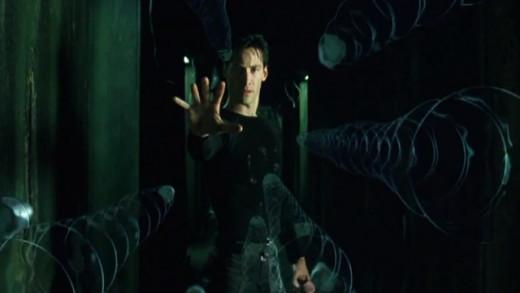
Click Here for a preview
Thomas Anderson, aka Neo (played by Keanu Reeves), is a lowly computer programmer by day and an intelligent computer hacker by night. His hacking ability aside, though, he's really a good-guy nobody; just another lifeless office drone who spends most of his days in a cubicle and all of his nights online. And, as evident by his inability to even balance on a buildings ledge without wetting himself (when fleeing three mysterious agents who are presumably after him due to his illegal hacking), it's clear that he's a wee bit of a fraidy cat as well. At least, this is Neo's life so far.
When he meets another hacker by the name of Trinity, though, who introduces him to a mysterious man named Morpheus, Neo's boring life soon takes a sudden change when he learns that the world he's been living in is actually a computer program known as The Matrix. Outside of the Matrix, the year is approximately 2199 and the world is a wasteland. Robots have apparently taken over the earth and have been using peoples bodies (locked inside of tubes, plugged into the Matrix) as their own personal batteries. And it's our nancyboy Neo who has been prophesied as being "the one" who will save the human race.
As Neo repeatedly falls short of expectations, neither he nor we as viewers are ever quite certain if he's actually the one savior of the world or not. But, savior or not, we eventually do get to see this computer geek transform into one machine gun wielding, kick ass kung fu master badass. And when you've got badass, who really needs a savior anyway?
Buy at...
17. Falling Down (1993)
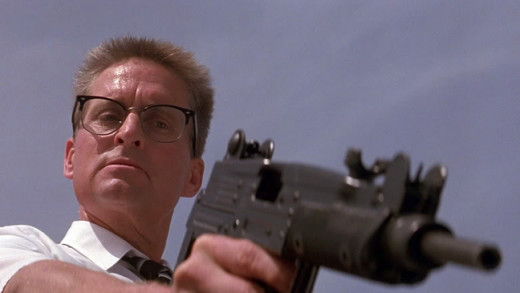
Click Here for a preview
On one blisteringly hot day in California, mild-mannered William Foster (Michael Douglas) is having one of those days. Recently divorced, laid off from his job, late for his daughters birthday party, and stuck in a traffic jam with his air conditioning on the fritz (wouldn't ya know), the groundwork is clearly laid for him to crack. Having had enough, he ditches his car in traffic (much to the chagrin of the drivers behind him) and begins to take off on foot to get home.
Sick with the current state of society, and dressed like Dilbert in a white t-shirt shirt, tie, thick rimmed glasses, and a buzz cut, William comes across one scenario after another on his way home that just further adds to his already precarious mental state.
On this journey to mental collapse, he more and more begins to wreak havoc on the streets of Los Angeles by destroying a grocery store with a baseball bat because of the high price of soda, holding up a fast food restaurant when they refuse to sell him breakfast, firing a rocket launcher at lazy road crews who haven't been doing their job, and taking on white supremacists, gang members, and anyone else who gets in his way. All the while, leaving the confused policemen on his trail clueless as to what's going on.
Buy at...
16. Cop Land (1997)
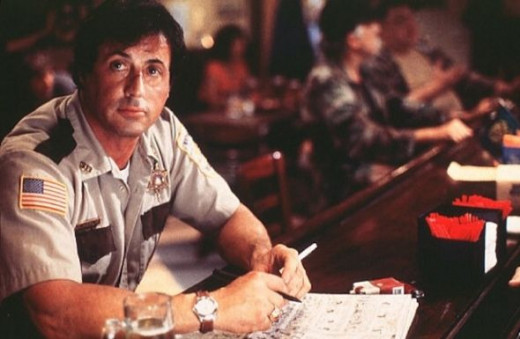
Click Here for a preview
In this critically acclaimed crime drama staring more A-listers than you can shake a little golden statue at (including the one and only Robert De Niro and an uncharacteristically chunky Sylvester Stallone, who gained 40 pounds for his role), Cop Land tells the tale of a New Jersey town overflowing with corrupt police officers.
The town itself (the "cop land") is watched over by a plump, half-deaf sheriff named Freddy (Stallone) who, while being mild-mannered and having a kind disposition, generally turns a blind eye to the misdoings of the "real police" who populate his town. In a sense, Freddy is only a figurehead; spending most of his days watching for speeders and helping cats out of trees, he's basically a sheriff only by name, appointed to his position due simply to his willingness to look the other way while the cop-citizens of his town do as they please. But when the corruption begins to put lives in danger, Freddy soon finds that if he doesn't stand up and take matters into his own hands, no one will.
Vague enough plot summary for ya? Sorry about that. But going into too much detail for this fantastic film would ruin the whole thing. Just trust me when I say, when Freddy quits turning a blind eye and starts standing up for justice, what culminates is one helluva breaking bad moment where the underdog steals the show.
Buy at...
15. Heathers (1988)
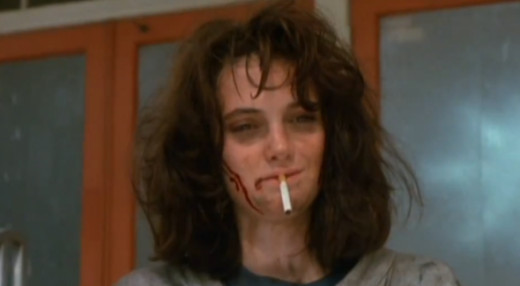
Click Here for a preview
In 1988's pitch black comedy Heathers, Veronica Sawyer (played by a particularly hot Winona Ryder) is the one non-Heather in a small clique of three wealthy popular girls who all have the same first name. They're vain, ruthless, and spend each day roaming the halls of their high school making fun of and picking on the less fortunate. And while reluctant about her part in the cliques misdoings, and not a Heather by name, Veronica is still, nevertheless, one of the girls.
At least, that is until she meets a gun-toting rebel in a trench coat named JD (Christian Slater) who begins to persuade her into realizing that popularity isn't all it's crack up to be; and that perhaps the more vicious of the in-crowd may be better off dead. Veronica actually breaks bad twice in this flick; first when she begins fighting back against the populars and then again after she starts to fight back against JD whose blood-lust starts to get a wee bit out of control.
Buy at...
14. God Bless America (2011)
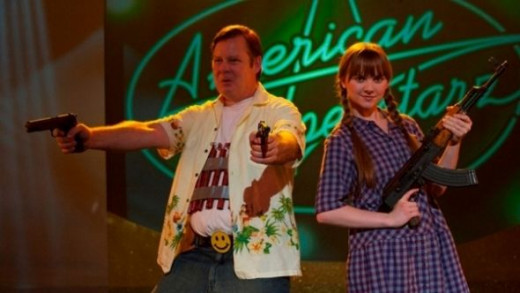
Click Here for a preview
Fed up and disgusted with crazy tea party conservatives, overly sensitive liberals, bigoted religious zealots, snobby rich kids, loudmouthed political commentators, reality TV shows that profit on making fun of the misfortunate, and basically all the other rude and inconsiderate douche bags, Frank Murdoch (Joel Murray) has been fantasizing about breaking bad and killing the whole lot of them for a very, very long time.
Normally, of course, Frank would never actually act on those fantasies; but when he finds out he's got a terminal brain tumor and hasn't much time left to live, he figures: why not? From there on, God Bless America becomes a brutally violent and hilarious film that, while seeming like a gratuitous blood bath, actually has a real message to convey about the current state of popular culture in the USA, and its negative effects on people. And while no one in the real world should ever actually go on a rampage, killing all "not nice" people, it's actually pretty darn fulfilling to see our deep and dark fantasies played out when Frank gets his hands dirty for us.
Buy at...
13. Bulworth (1998)
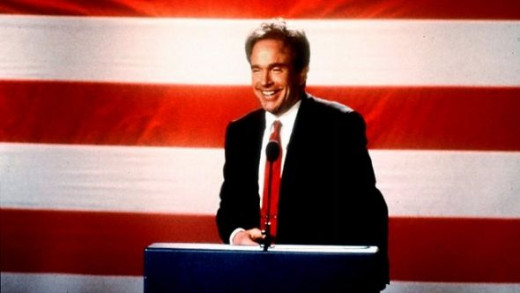
Click Here for a preview
California Senator Jay Billington Bulworth (Warren Beatty) has lost all hope and faith not only in politics but in his life as well. The views he stood so diligently for and felt so passionately about in the past have become lost; replaced by typical political talking points, spin, and the ongoing quest of playing it safe in order to get reelected. His personal life, as well, has become nothing but a sham, as he and his wife openly carry on affairs while they stay together, putting on a happy facade, only in the interest of maintaining a good public image for voters. Disgusted by it all, Bulworth has had enough and decided to end it all. Instead of committing suicide, though (which would prevent the insurance company from giving his daughter her inheritance), Bulworth instead hires a hitman to assassinate him. Makes sense, right?
As usual, when a man has nothing to lose, that's the perfect time for cutting loose, losing all inhibitions, and breaking bad. Knowing that he's already signed his death warrant and now just waiting for the other shoe to drop, Bulworth begins to let all of his real thoughts and feelings fly as he spends what's left of his life going out, drinking, dancing, getting high, hanging out at clubs, and drunkenly talking to the media (as we all would). No longer worried about public image or reelection, he finally starts telling it like it is (sometimes spitting out raps about how it is) about government payoffs, healthcare, insurance companies, race, and everything else that's on his mind.
When we see Bulworth break bad, we see a depiction of a political figure actually doing what most of us always wished real life political figures would always do -- tell the truth. And it feels oh so good.
Buy at...
12. Carrie (1976)
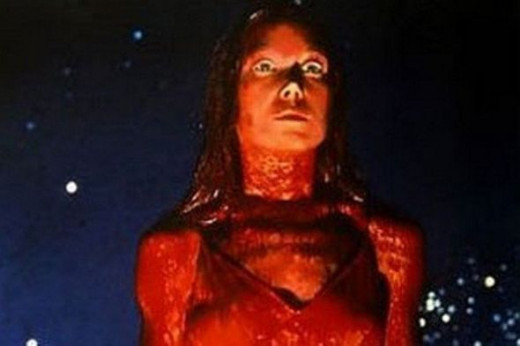
Click Here for a preview
Sweet little Carrie White is a shy, soft-spoken teenager living a very sad and miserable life. At home, she's abused by her half-mad (bordering on completely batshit) Christian Fundamentalist mother who locks her in closets, berates her with scripture, and condemns her for things as innocent as getting her period; and at school things aren't any better, as Carrie is continuously getting ridiculed, humiliated, and tormented by all of her peers on a daily basis. If all of this wasn't bad enough, our unfortunate heroine also happens to have growing telekinetic powers to deal with, which always seem to flare up beyond her control whenever she becomes angry or otherwise emotionally overwhelmed.
Through all of this, though, Carrie remains quiet, timid, and hopeful. But with each new humiliation she's forced to endure, a rage bubbles up inside her; and the rage of Carrie is not one to be taken lightly.
Buy at...
11. Office Space (1999)
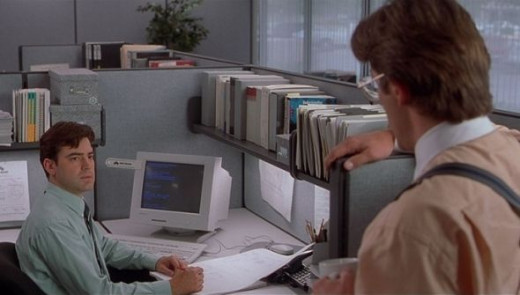
Click Here for a preview
The movie follows Peter Gibbons (Ron Livingston), a disgruntled office worker who spends most of his days sitting in his cubicle staring at his desk, waiting for the day to end. Depressed with his life and tired of this go-nowhere job, Peter eventually decides to see a hypnotherapist who hypnotizes him into being temporarily more relaxed. But before snapping Peter out of this trance, though, the hypnotherapist suddenly drops dead of a heart attack, leaving him stuck in this exceedingly carefree state, which he then goes out into the real world with.
From there, he begins to go through life on his own terms, playing hooky at work, ignoring his jobs dress code, tearing down his cubicle walls in order to get a window view, and telling his superiors how he really feels. Surprisingly enough, this new carefree attitude actually manages to land Peter a promotion (I know, right?!). But as great as all this is, when Pete finds out that his friends are being laid off while he's being rewarded for insubordinate behavior, he decides to recruit them in exacting the kind of revenge on their life-sucking office that they've always known it deserved.
Set in the kind of drab and lifeless cubicle-filled office that's familiar to many white collar slaves of the mundane out there, Mike Judge's Office Space (based on Judge's Milton cartoon series) touched so close to home for real life sympathetic office drones, that the movies protagonist, Ron Livingston, continues to this day to have college students and office workers approach him, saying that he inspired them to quit their job, long after the films initial release. So, suffice it to say, the fact that the movie has since been elevated to a well deserved "cult classic" status isn't too surprising; I mean, It even makes its viewers break bad!
Buy at...
10. Dead Man (1995)
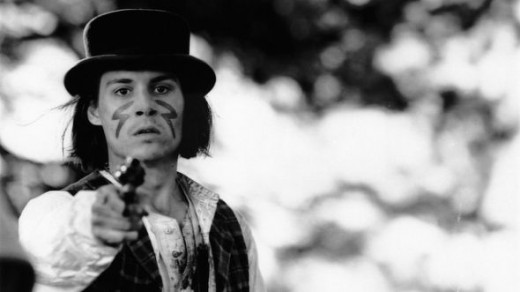
Click Here for a preview
In this bizarre-yet-awesome "psychedelic western," William Blake (played by Johnny Depp) is a timid, clean-cut city boy who's taken the train to a wild west town with expectations of receiving a job as a bookkeeper. After arriving at the workplace, though, Blake finds that his position's been filled; leaving him jobless, alone, and with no prospects ahead of him. Eventually he runs into a woman who takes a liking to him and takes him home with her, only to have her ex-boyfriend show up moments later, catching the two in bed, and firing his gun at Blake, accidentally killing the woman instead while only wounding Blake. After killing the man in self-defense and then wandering around the town in a daze, Blake suddenly finds himself waking up in the woods as a wanted man.
Having to survive off the land and protect himself from bounty hunters, criminals, and marshals, in Dead Man we watch as circumstance and self-discovery (with a little help from an overweight, poetry reciting Native American) transforms the one civilized man (in a town full of ignorant and gun-toting "philistines") into a notorious and legendary outlaw of the old west who breaks badder and badder until the very end.
Buy at...
9. Punch-Drunk Love (2002)
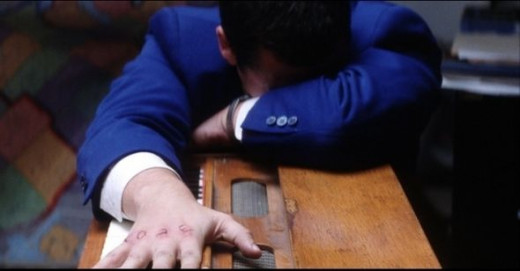
Click Here for a preview
In acclaimed director, Paul Thomas Anderson's, beautiful and somewhat quirky love story, Punch-Drunk Love, the quiet, timid, and agonizingly shy Barry Egan (played by Adam Sandler, in the best role he's had thus far) is depressed with his life, lonely, and seemingly incapable of having a normal social interaction with anyone he comes in contact with (especially women). His seven loud and overbearing sisters, who continuously bring up embarrassing childhood stories about Barry and talk about how weird he is, aren't much of a help to his self-confidence either. All in all, Barry is a pretty sad and pathetic guy, but when he eventually meets a woman who likes him for who he is, he begins to find a new lease on life.
In a sort of weird way, Punch-Drunk Love is kind of like the story of Popeye. Only instead of spinach making him strong and brave, it's the power of love that causes Barry to open up and break bad as he fights to protect the one good thing that he's found in his miserable life.
Buy at...
8. Network (1976)
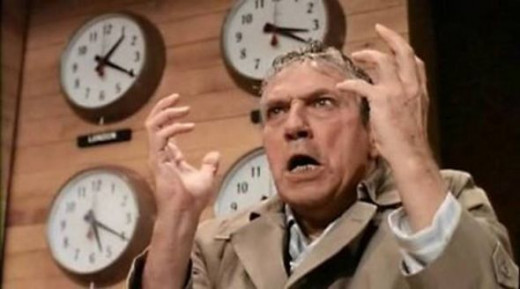
Click Here for a preview
Howard Beale (Peter Finch), a longtime anchor for an Evening News team, has just found out that his show has been cancelled due to low ratings. A childless widower, Howard's job was the only thing he had going for him, so two weeks before his last show, he cracks and announces on live television that he will commit suicide on next Tuesday's broadcast; in his words, "Giving the public relations people a week to promote the show."
After the show, Howard is fired. But his friend and boss allows him to have one final broadcast so that he can apologize for his outburst and give a dignified farewell to his viewers. Howard agrees, but once on the air, he finds himself launching into a rant about how he's grown tired of life's "bullshit." The network is initially angry, but, to their surprise, the public eats up Howard's apparent breakdown, causing his ratings spike. So, instead of getting Howard psychiatric help he probably needs, the head honcho's of the network decide to exploit him by giving him his own show so he can continue on with his "insane" diatribes and say whatever he wants.
Whether or not Howard went mad or really did simply run out of bullshit, it's unclear. But this portrayal of a man breaking bad on television, acting as "an angry prophet denouncing the hypocrisies of our times" struck a cord not only with the nation on the movie, but the nation in real life as well. Winning four Academy Awards (including a posthumous Best Actor award for Finch, who died shortly after the movies release) the film goes down as a classic in the history of cinema. Showing that maybe Howard wasn't the only one "mad as hell and not going to take it anymore."
Buy at...
7. Something Wild (1986)
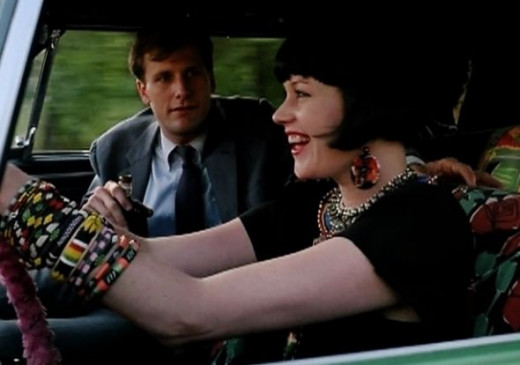
Click Here for a preview
One of the unsung greats from director Jonathan Demme (Silence of the Lambs), this dark comedy-drama follows a clean-cut, straight-laced banker named Charles Driggs (Jeff Daniels) as he finds himself loosening his tie (both literally and metaphorically) and getting in touch with his wild side after randomly meeting a sultry, free spirited vixen named Lulu (Melanie Griffith).
Something Wild captures perfectly how breaking bad can feel so good. Jeff Daniels' character, Charley, is the quintessential nice guy; he's friendly, polite, courteous, wholesome, and all-around fresh-faced; the kind of guy that every mother yearns to see her daughter bring home. But beneath all that, something's missing from his life. Charley has a wild side that he's just dying to set free. Of course, he doesn't know that yet, but it still comes out in a few little ways here and there (such as telling white lies, and going to restaurants and sneaking out without paying his bill, for instance).
It's not until Charley meets the sexy and mysterious wild child, Lulu, that he finds that what he's been missing from his life is the excitement of living it. While reluctant at first, Charley soon finds himself getting lost in Lulu's wild ways.
Of course, the fun ends and things take a pretty dark turn about halfway in the movie after Charley comes in contact with Lulu's ex-convict husband, Ray (played fantastically by Ray Liotta, in his first starring film role), but you'll just have to watch the movie to see how that turns out (let's just say, some things can get a little too wild).
Buy at...
6. Thelma & Louise (1991)
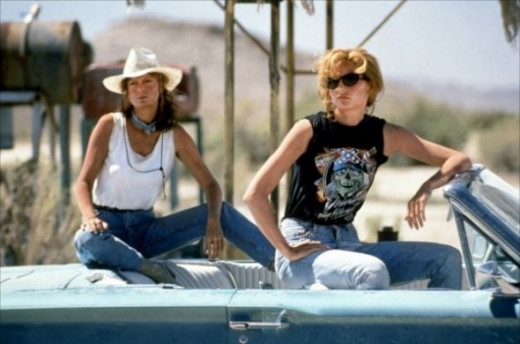
Click Here for a preview
In Thelma and Louise we get two for the price of one, when two sweet and normal southern gal's break real bad in a 1966 Ford Thunderbird convertible after they kill a rapist in self-defense and find themselves on the run from the law.
The two ladies in question are the titular characters of the film, Thelma (Geena Davis), a cute, perky, yet timid housewife married to a controlling and overbearing husband, and Louise (Susan Sarandon), a single waitress, strong and independent, yet haunted by traumatizing events from her past. In need of a break from their mundane and conservative lives, the two decide to cut loose, let their hair down, and go out on a two-day vacation to the mountains. A vacation that quickly goes awry when the two stop off at a bar and Louise shoots and kills a man who attempts to rape Louise in a parking lot.
From there on, these two sweet ladies find themselves as outlaws with nothing to lose, taking Louise's Thunderbird convertible across the border to Mexico to avoid capture by the police by any means possible. Robbing gas stations, blowing things up, drinking whiskey, smoking cigarettes, and getting even with every scoundrel they run into along the way, these badass bitches empowered women everywhere.
Buy at...
5. Taxi Driver (1976)
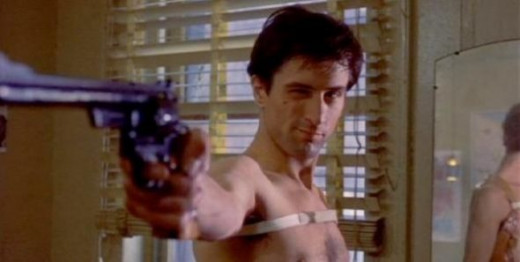
Click Here for a preview
Depressed ex-Marine, Travis Bickle (Robert De Niro), spends his every night cruising the dirty streets of New York in his taxicab. Plagued by loneliness and disgusted by all of the "filth" of the city (the prostitutes, junkies, pimps, corruption, etc.), Travis slowly begins to have a break down, and decides to take matters into his own hands by cleaning up the trash himself; or, as he puts it: "Here is a man who would not take it anymore. A man who stood up against the scum, the cunts, the dogs, the filth, the shit. Here is a man who stood up." And, boy, can he stand up!
After training himself daily, purchasing a nice amount of weaponry, and shaving his head in a pretty sweet ready-for-battle mohawk, Bickle eventually reaches his boiling point and lashes out on the city. I won't spoil it for you if you haven't seen it (blasphemy if you haven't though!) but, regardless of whether or not his actions were motivated by insanity or virtuosity, Travis Bickle breaks bad in one big and memorable way.
Buy at...
4. American Beauty (1999)
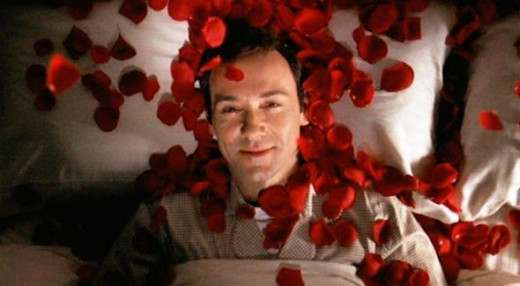
Click Here for a preview
Jaded and depressed with his measly little mundane, suburban life, poor Lester Bernham (played by Kevin Spacey), who's been kicked around by his workaholic wife, his daughter who hates him, and his bosses who show him no respect, has suddenly decided to make a change. A big change.
He quits his job, tells his boss to perform coitus on himself (blackmailing him for almost 60,000 dollars in the process), begins working out, smoking pot, buys the sports car that he's always wanted, and starts standing up for himself to all those who have been pushing him around for far too long. Call it a midlife crisis if you want, but as far as Lester is concerned, he's finally awoken from a coma that he's been hopelessly stuck in for the last 20 years.
American Beauty perfectly shows, not only through Lester, but through all of its characters, the wild side that's pent up and just waiting to come out behind the reserved facade that so many of us put on in order to appear "normal".
Buy at...
3. Unforgiven (1992)
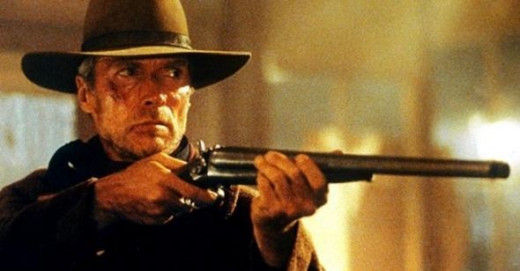
Click Here for a preview
The story of Clint Eastwood's 1992 western, Unforgiven, revolves around an aging man named William Munny (Eastwood), who used to be one of the most notoriously vicious and cold-blooded outlaws in the west, but who has long since hung up his guns and become a simple-living widower and family man, living a quiet life on his farm with his two young children.
Granted, that since the story of Unforgiven starts out with William Munny already being a bad character that's broken good, you could make an argument that he shouldn't belong on this list. But as far as the movie itself goes, we never see Munny's bad past, we only hear about it. What's shown to us on screen is a good, thoughtful, and repentant man who doesn't swear, doesn't drink, and cares only about taking care of his two little children. After a group of prostitutes offer a thousand dollar reward to whoever kills a man that "cut up" one of their friends, though, it's Munny's dedication to taking care of his kids which pushes him back into his old ways.
Throughout the majority of the film, Munny struggles with his past, trying to not let this last bounty hunt turn him back into who he once was. But, try as he may, every man has his breaking point. And William Munny's breaking point in Unforgiven is one of the most memorable breaking bad moments you'll ever see.
Buy at...
2. Fight Club (1999)
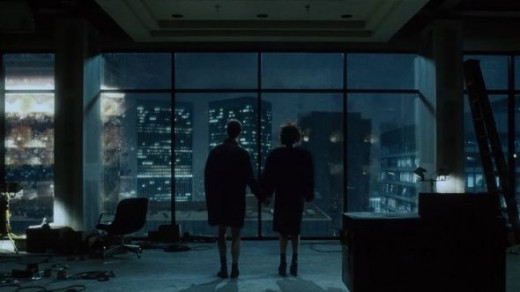
Click Here for a preview
From metaphors about generation conflicts, to commentaries on the value system of advertising, and not-so-ambiguous messages about materialism and consumerism, suffice it to say, there's a whole heck of a lot going on in David Fincher's 1999 cult favorite, Fight Club. But, as fascinating as all that is, what places this movie so high on our list today is its story of how one person can go from a quiet, nice-guy nobody, to the untouchable leader of a giant underground terrorist organization hellbent on worldwide chaos. Now if that ain't breaking bad, I don't know what is!
The nice guy in question is a nameless everyman (played by Edward Norton) who's spent his entire life doing everything he's been taught to do in order to fit into the world (go to school, get a good job, get a nice apartment, buy nice things, etc.). He finds himself hopelessly stuck in his mundane life, with no excitement to be found and no foreseeable new opportunities to look forward to. Plagued with insomnia, and incapable of finding happiness, this unnamed man (who we'll call "The Narrator", due to his narration of the film) desperately wants to change his life, but has no idea of how. That is, until he meets a handsome, magnetic, free spirited soap maker, named Tyler Durden (Brad Pitt), who has some very outspoken and alluring outlooks on life,
The Narrator slowly finds himself becoming more and more attracted to Tyler's philosophies on how to live. He quickly begins slipping completely out of his past nice-guy ways, starting to stand up for himself, quitting the job he hates, blackmailing his boss, and eventually, alongside Tyler, becoming the leader of a large group of followers who have also grown numb and tired of their boring, go-nowhere lives, and have decided to break bad as well.
The great thing about Fight Club is that it isn't doesn't just show us one man who is breaking bad, but rather it gives us an example of how breaking bad may be something all of us not only desire, but actually need in order to feel alive.
Buy at...
1. The Godfather (1972)
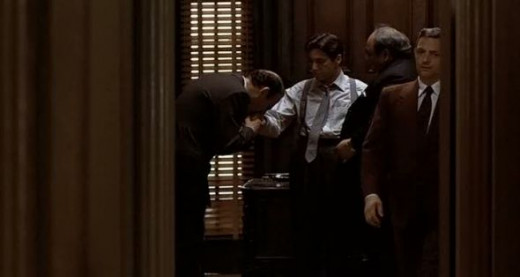
Click Here for a preview
Considered by many as being one of the greatest films to ever grace the big screen, this classic 1972 gangster movie is a veteran at nabbing the number one spot on Top Movie lists. Whether or not it's truly deserving of this acclaim most of the time, you can be the judge of that. But as far as movies about good guys who break bad go, this is without question the reigning king.
The story follows Michael Corleone (Al Pacino), the nice, soft-spoken, well-mannered college boy and war hero, who was the one good egg in the Corleone crime family. The youngest son of Mafia boss Don Vito Corleone (Marlon Brando), it was Michael that was the one child not expected to follow in his fathers criminal footsteps. After a failed assassination attempt lands his pops in the hospital, though, it's Michael who inevitably finds himself having to step up and take the reins of the family business.
In the first Godfather movie, the smooth transformation we see Michael Corleone make from innocent, well-intentioned, all-American good guy, to ruthless Mafia kingpin is fantastic. It starts out subtly enough when we get our first look of just how cunningly Michael can think on his feet, when he visits his father at the hospital and devises an intelligent scheme to trick rival gangsters from finishing their botched job on his dad. Then, after thwarting the killers, when he's lighting a cigarette for the scared and shaky butcher who he'd enlisted to help him fool the would-be assassins, even Michael himself appears shocked when we catch a brief glimpse at just how steady his hands have remained during this nerve-racking situation. It's perhaps at this moment when Michael realizes that there's something darker inside him that he'd never recognized before.
After this, Michael's descent into "bad" only grows. Slowly but steadily, he finds himself masterminding criminal plans, being involved in assassinations, ordering people to be killed, lying to his family, and eventually becoming the most feared and revered criminal in the land -- Don Michael Corleone.
From Walter White to Travis Bickle, there will always be movie and TV characters that break bad; but, try as they may, none will ever do it quite this good.
Buy at...

![A History of Violence (New Line Platinum Series) [DVD]](https://m.media-amazon.com/images/I/510uoqBO+4L._SL160_.jpg)

![The Ultimate Matrix Collection [Blu-ray]](https://m.media-amazon.com/images/I/41So64kytuL._SL160_.jpg)

![Cop Land (Exclusive Director's Cut) (Miramax Collector's Edition) [DVD]](https://m.media-amazon.com/images/I/51H0PB814HL._SL160_.jpg)
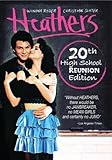


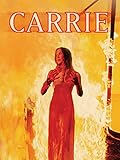
![Office Space (Special Edition with Flair!) [Blu-ray]](https://m.media-amazon.com/images/I/51ZAPtJ9stL._SL160_.jpg)



![Something Wild (The Criterion Collection) [Blu-ray]](https://m.media-amazon.com/images/I/51FkDcaofaL._SL160_.jpg)
![Thelma & Louise (20th Anniversary Edition) [Blu-ray]](https://m.media-amazon.com/images/I/61PVQD5Yd5L._SL160_.jpg)

![American Beauty (Sapphire Series) [Blu-ray]](https://m.media-amazon.com/images/I/61qqjXCmXGL._SL160_.jpg)


![The Godfather Collection (The Coppola Restoration) [Blu-ray]](https://m.media-amazon.com/images/I/51z4hmju1pL._SL160_.jpg)
